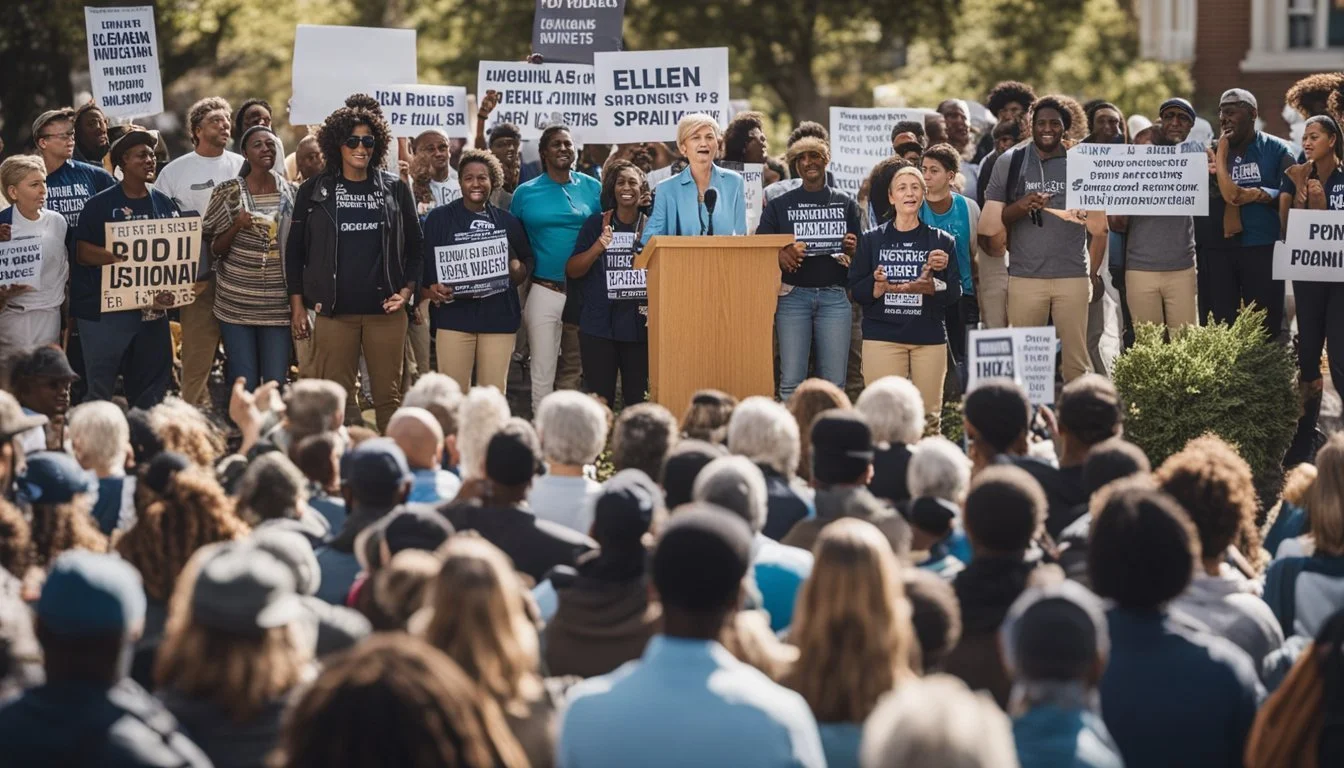Ellen Spiro: Advocating for Social Justice and Human Rights in Today's Society
Ellen Spiro stands as a powerful figure in the realms of social justice and human rights advocacy, consistently using her documentary filmmaking to challenge societal norms and amplify marginalized voices. Through her evocative films, Spiro has provided critical insights into significant issues such as HIV/AIDS, disability rights, and gender justice, often highlighting stories neglected by mainstream media. Her dedication to activism and her innovative approach to media make her an essential subject for those interested in the transformative power of documentary storytelling.
Her work with organizations like ACT-UP showcases Spiro's commitment to addressing urgent crises and advocating for equitable treatment of all individuals. By merging personal narratives with broader social commentary, she has crafted a unique space in the media landscape where activism and artistry intersect. Ellen Spiro's films not only inform but inspire action, underlining the role of creative media in driving social change.
Early Life and Education of Ellen Spiro
Ellen Spiro's formative years shaped her lifelong passion for social justice and storytelling. Raised in a culturally rich environment, she was exposed to diverse perspectives that influenced her worldview.
From a young age, Spiro displayed a keen interest in the arts. This early passion led her to pursue higher education, where she could refine her skills and expand her horizons.
Spiro attended the University of Texas at Austin, a renowned institution known for fostering creative talent. Here, she immersed herself in the study of documentary filmmaking, honing her craft under the guidance of experienced mentors.
Her academic journey was marked by a commitment to exploring social issues through film. This focus became a defining characteristic of her work, earning her recognition in both national and international circles.
In addition to her formal education, Spiro's early career was influenced by hands-on experiences and collaborations. These opportunities allowed her to apply theoretical knowledge to real-world projects, contributing to her growth as a filmmaker.
Ellen Spiro's educational background played a pivotal role in her development as an advocate for social justice and human rights. Her time at the University of Texas at Austin not only refined her technical skills but also deepened her understanding of the power of documentary film as a tool for change.
Career Path and Major Works
Ellen Spiro's journey in filmmaking has been shaped by her dedication to advocating for social justice and human rights. This section examines her entry into filmmaking, her impactful documentaries, and her roles in teaching and mentorship.
Entry into Filmmaking
Ellen Spiro began her career in filmmaking during the early years of her education. She attended New York University, where she developed her passion for documentary filmmaking. Graduating with a degree in film, she honed her skills by creating short films that highlighted social issues.
Her interest in social justice was evident early on as she chose subjects that were often marginalized. This commitment laid the groundwork for her later works.
Documentaries with a Cause
Spiro is best known for her thought-provoking documentaries that address critical social justice and human rights issues. Her film "Body of War" presents a powerful narrative of a young veteran's struggle, exemplifying her ability to bring personal and poignant stories to the screen.
Another significant work, "Atomic Mom," explores the impact of nuclear weaponry, demonstrating her range and dedication to diverse human rights topics. Awards and recognition from various film festivals underscore the influence and importance of her films in driving change and awareness.
Teaching and Mentorship
Beyond her filmmaking, Ellen Spiro is an influential educator. She holds a professorship at The University of Texas at Austin, where she inspires the next generation of filmmakers. Through her courses on documentary filmmaking, Spiro emphasizes the importance of storytelling in advocating for social justice.
Her mentorship extends beyond the classroom as she frequently engages in workshops and seminars, providing valuable guidance to emerging filmmakers. Her ability to combine theory with practice makes her an esteemed figure in both educational and activist circles.
Advocacy Through Visual Storytelling
Ellen Spiro has made significant contributions through her work as a documentary filmmaker. She utilizes visual storytelling to highlight critical social justice issues and human rights abuses.
Visual storytelling can provoke thought and evoke strong emotions. Spiro leverages this to spark dialogue and motivate action. Her films often focus on marginalized communities and underserved populations.
Spiro’s style integrates personal narratives with broader social commentary. This approach allows viewers to connect deeply with the subjects' stories. Body of War is one such film that showcases her commitment to advocacy.
Visual mediums such as photos, videos, and documentaries have a unique ability to convey complex topics succinctly. They bring abstract concepts to life through real-world examples and personal testimonies.
Key Elements of Spiro’s Visual Storytelling
Personal Narratives: Real-life stories of individuals impacted by social issues.
Emotion and Connection: Creating emotional bonds between the audience and the story's subjects.
Broader Social Context: Situating individual stories within larger systemic issues.
Call to Action: Encouraging viewers to engage with and act upon the issues presented.
These components are crucial in making her work compelling and effective in advocating for social change.
Collaborations and Partnerships
Ellen Spiro is renowned for leveraging collaborations to amplify her advocacy for social justice and human rights. Her work spans partnerships with activists, fellow filmmakers, and academic institutions, each contributing uniquely to her mission.
Work with Activists
Spiro collaborates closely with activists to amplify their voices and causes. By aligning with grassroots movements, she helps bring critical issues to broader audiences. She often engages in projects that promote awareness and mobilize action on pressing social justice topics.
For instance, her work has highlighted the struggles of marginalized communities, drawing attention to systemic inequities. These partnerships emphasize real-world impacts and the power of collective action.
Joint Projects with Filmmakers
Joint projects with other filmmakers are a cornerstone of Spiro's approach. Collaborating with directors and producers, she creates compelling documentaries that resonate with diverse audiences. These joint ventures allow for pooling resources, talents, and perspectives.
One notable collaboration was with filmmaker Karen Bernstein on the documentary "Body of War," which chronicled the life of a paralyzed Iraq War veteran. This partnership brought a deeply personal and political story to light, demonstrating the strength of collaborative filmmaking.
Academic Alliances
Spiro also forms alliances with academic institutions to foster research and education on social justice issues. These collaborations often lead to the development of educational materials and screenings in academic settings, enriching the discourse on human rights.
She has worked with universities to create documentaries that serve as teaching tools, sparking discussions and encouraging critical thinking among students. These academic partnerships ensure that her work not only informs but also educates future generations.
Impact and Recognition
Ellen Spiro has significantly influenced social justice and human rights through her outstanding contributions to documentary filmmaking and academia. She has received numerous awards and honors for her impactful work.
Awards and Honors
Ellen Spiro has earned numerous prestigious awards throughout her career. Her documentary "Body of War," co-directed with Phil Donahue, received critical acclaim and several awards, including the National Board of Review's Best Documentary award. Additionally, Spiro's work has been recognized with a Guggenheim Fellowship, showcasing her commitment to excellence in filmmaking.
Another notable mention is her win of the Gracie Award for Outstanding Director. These accolades reflect recognition of her dedication and impact in shedding light on social issues.
Influence on Documentary Filmmaking
Spiro has made a lasting imprint on the field of documentary filmmaking. Her innovative storytelling techniques bring attention to marginalized voices and human rights issues. Films like "Are the Kids Alright?" and "Atomic Mom" demonstrate her commitment to embedding social justice themes in her work.
By blending personal narratives with broader social concerns, she has set new standards for documentary filmmakers. Her approach emphasizes authenticity and emotional resonance, creating compelling narratives that engage and educate viewers.
Contributions to Academia
Ellen Spiro has also significantly contributed to academia through her role as a professor at the University of Texas at Austin. She nurtures the next generation of filmmakers, emphasizing the importance of social justice in media.
Her academic work includes publishing articles that focus on integrating human rights and social justice principles into documentary filmmaking. As an educator, Spiro is acclaimed for her ability to inspire students to use their craft as a tool for activism and change, encouraging them to explore and address pressing societal issues through their work.
Personal Philosophy and Inspirations
Ellen Spiro's approach to social justice and human rights is rooted in a deep commitment to equality and fairness. Her belief in the power of storytelling to effect change is central to her work as a filmmaker.
She is particularly inspired by the resilience and courage of marginalized communities. These groups often serve as both subjects and collaborators in her projects. Spiro’s focus on amplifying underrepresented voices highlights her dedication to inclusive representation.
One of Spiro’s key influences is the International Covenant on Economic, Social, and Cultural Rights (ICESCR), which reinforces her belief that social justice is an integral part of human rights. She often refers to the ICESCR in her advocacy work.
Spiro also draws inspiration from historical movements and figures that have championed human rights and social justice. These influences inform her narrative style and thematic choices in her films.
Key Inspirations:
Marginalized Communities: Their resilience and stories.
ICESCR: A guiding document for human rights.
Historical Figures and Movements: Influencing her thematic approach.
She emphasizes collaboration and community engagement in her projects, believing that true social change comes from collective effort. This philosophy shapes her work process and the way she interacts with her audiences.
Current Projects and Future Directions
Ellen Spiro is actively working on documentary films that address pressing social justice issues. Recently, she has collaborated with several non-profits to highlight the struggles of marginalized communities. Her focus remains on giving a voice to those who are often unheard.
She is also engaged in educational outreach programs. These initiatives aim to train the next generation of activists and filmmakers. Workshops and seminars led by Spiro emphasize the crucial role of media in advocating for human rights.
Furthermore, Spiro is exploring new storytelling formats. Virtual reality (VR) and augmented reality (AR) are being examined as tools to create immersive experiences. These technologies have the potential to engage audiences in novel ways, fostering empathy and understanding.
There are plans to expand her collaborative network. Working with international organizations, she aims to bring global perspectives to local issues. This strategy will not only broaden the reach of her projects but also enhance their impact.
In addition, Ellen Spiro is committed to policy advocacy. By partnering with legal experts and social justice organizations, she strives to influence legislative change. Her documentaries often serve as powerful catalysts for advocacy campaigns.
Key Areas of Focus
Documentary Films: Highlighting social justice issues.
Educational Outreach: Training new activists and filmmakers.
New Media Formats: Exploring VR and AR for storytelling.
Collaborative Networks: Partnering with international organizations.
Policy Advocacy: Working towards legislative change.
These efforts underscore Ellen Spiro's dedication to advancing social justice and human rights through diverse and innovative approaches.
Publications and Public Speaking
Ellen Spiro has made significant contributions to social justice and human rights through her numerous publications and public engagements.
Publications
Ellen is known for her thought-provoking articles and reports. She has written extensively on social justice, equity, and inclusion.
Her works are featured in key journals and platforms, emphasizing anti-racist initiatives within organizations. These publications highlight connections between workplace efforts and broader discussions on human rights.
Title Focus Advocating for Social Justice in the Workplace Anti-racist initiatives Human Rights in Organizational Structures Broader human rights discussions
Public Speaking
Ellen is also a sought-after speaker at conferences and seminars. Her presentations cover a range of topics including social justice, human rights, and organizational change.
She has addressed audiences at notable events, sharing insights on creating inclusive environments and promoting equity.
Her keynote speeches are known for their clarity, impactful messages, and calls to action, inspiring organizations to adopt more just practices. Ellen's ability to communicate complex ideas in an accessible manner has earned her recognition as an influential voice in the field.






